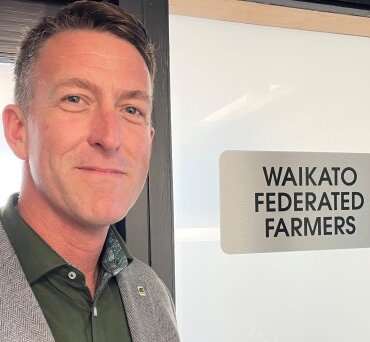
Phil Sherwood
Until recently Waikato Federated Farmers met at the organisation’s Hamilton office. As senior writer Chris Gardner finds, they need somewhere else now.
Waikato Federated Farmers president Phil Sherwood on the farm. Photo: Chris Gardner.
Waikato Federated Farmers new president Phil Sherwood is taking the executive on the road.
Sherwood, 40, says the first executive meeting of his presidency would be held in the Waipā district coupled with an event to attract members.
“It’s part of the engagement process, taking our executive and going back to the region,” he says.
The executive has met at the Waikato Farmers Trust building in Hamilton for decades, but the building’s recent sale has prompted a rethink.
“It was a good opportunity to reevaluate where we are at.”

The Waikato Farmers Trust building in Hamilton.
Sherwood, who up until last season farmed two dairy herds of 500 cows supplying Open Country on two farms near Matamata, was just a few weeks into his new role when The News caught up with him at Farmers Trust building where he and fellow members were sorting through boxes of memorabilia.
This season Sherwood is overseeing a 50/50 herd owner and share milker on one of his farms, and a contract milker on the other.
Educated at Hinuera School and Matamata College, Sherwood was raised on the family farm and took up farming at 16 where, apart from a couple of short spells off farm, he has remained farming.
In Federated Farmers, he has served as dairy chair and vice president, before succeeding Keith Holmes as president.
Profitability is a key word frequently mentioned at executive meetings.
“We need to be profitable, from not just a farming perspective but from a Waikato perspective. We need those industry groups like Beef + Lamb, DairyNZ and the Foundation for Arable Research to be really championing that profit,” he says.
“Profit will drive innovation.”
And he is waiting expectantly for the outcome of the government’s Finance and Expenditure Committee’s inquiry into banking competition.
“Banks have got their foot on the throats of some farmers,” he says.
“We feed into that rural economy, and I would like to think that they would take their foot of the throat of a few farmers trying to do the right thing.”

Phil Sherwood – on the farm
When it comes to rural advocacy, the issue at the top of Sherwood’s list is the upcoming Waikato River catchment wide implementation of farm environment plans as part of Waikato Regional Council’s Plan Change One.
Details are still sketchy, as the sector awaits a court ruling on the final form of the rules.
He wants to see a more holistic approach between farmers, the Department of Conservation, Operational Solutions for Primary Industries, and Waikato Regional Council around pest control to eliminate a siloed approach.
“The problem is that they all work in isolation to a common goal, and are not working collaboratively,” says Sherwood, who believes in finding common ground with others, realising you cannot be everything to everybody.
He also serves on AgriZero’s farmer focus group as it creates tools to rapidly reduce emissions while maintaining profitability and productivity.
It was too early to share too much about the work of the partnership between the government and agribusiness, but Sherwood hopes it would result in breaking the disconnect between farmer and consumer.

Waikato Federated Farmers president Phil Sherwood is seeking a new office after the sale of the Waikato Farmers Trust building in Hamilton. Photo: Chris Gardner.









